Google, Intel and Gwyneth Paltrow?: Tech Titans Opine On What's Next For IT
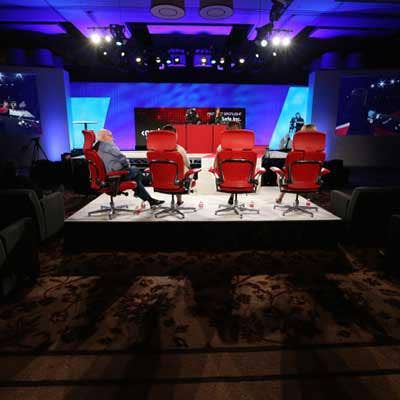
Tech Bigwigs Take The Stage
Some of tech's heaviest hitters took the stage for the inaugural Code Conference in Ranchos Palos Verdes, Calif., this week.
The event hosted a number of speakers ranging from Microsoft CEO Satya Nadella and Google Co-founder Sergey Brin, to actress Gwyneth Paltrow, who gave their take on the future of technology.
Here are some of the highlights.
All photos by Asa Mathat, Re/Code
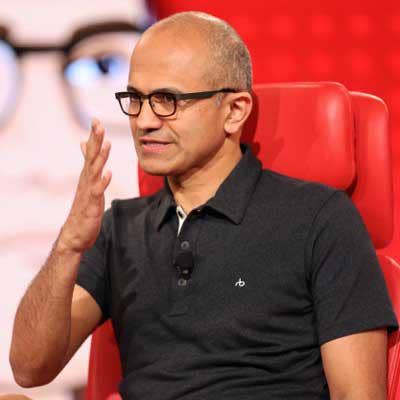
Microsoft's Next Steps
Newly appointed Microsoft CEO Satya Nadella has big plans for Microsoft, but was vague on the details.
The company's future growth depends on its ability "to build something big" and not necessarily an acquisition, although Nadella didn't rule that out.
"If, along the way, we have to buy things, that's fine … It's time for us to build the next big thing," he said.
Nadella, who previously served as executive vice president of Microsoft's Cloud and Enterprise group, took the top spot at Microsoft in February.
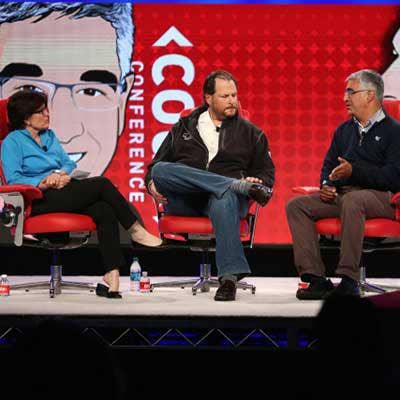
Enterprise and the Cloud Move
Salesforce.com CEO Marc Benioff and Aneel Bhusri, Workday co-founder and CEO, shared the stage with a talk that ranged from the enterprise shift to cloud to philanthropy among tech companies.
On the cloud movement, Bhusri said, "We're three or four years into a 15-year cycle."
That's not only shifted the industry to a post-PC world but a post-server world, Bhusri pointed out, "and it's hard to see a world where, other than a few edge applications, everything is headed toward the cloud."
The industry, according to Benioff, is "in this glorious third wave of computing."
"From our perspective," Benioff said, "a lot of the traditional business process is getting inverted and it's customer first. You certainly see that in the consumer examples."
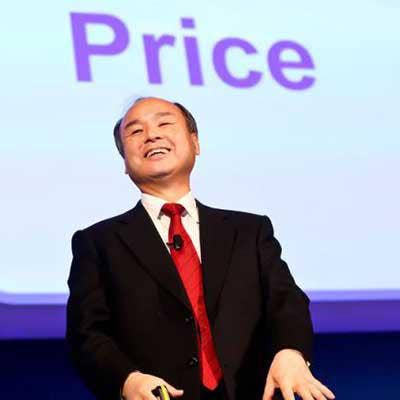
U.S. Broadband Speeds
SoftBank CEO Masa Son won laughs from the audience by knocking U.S. broadband speeds.
Son criticized U.S. broadband speeds saying the U.S., which clocks in at No. 15 in terms of speed, could be proud it beat the Philippines. "Oh my God, how can Americans live like this?" he said.
The billionaire founded SoftBank Japan, now called SoftBank Corp., in 1981. The company made waves when it announced its $21.6 billion purchase of a 72 percent stake in Sprint Corp., in a deal that closed last year.
Not bad for someone who said he faced criticism when he launched SoftBank "to fight against AT&T" with no experience or capital. "I just had anger," he said.
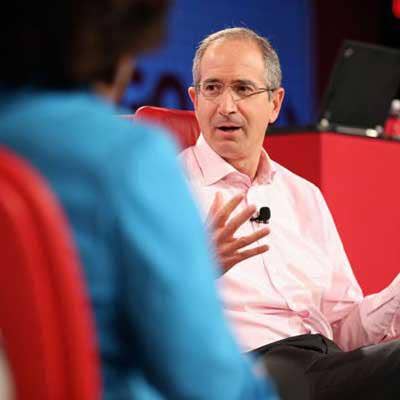
Why Comcast, Netflix Can't Get Along
Recode.net's Walt Mossberg and Kara Swisher grilled Comcast CEO Brian Roberts on the company's relationship with Netflix.
Mossberg asked Roberts why Netflix and Amazon Prime were missing from Comcast's set-top box, and the question was downplayed when Roberts said the new boxes had only just begun to roll out.
Mossberg countered that Netflix CEO Reed Hastings told him at the conference he'd be happy to do business with Comcast.
"We did a deal with Reed Hastings, and 10 days later, he wasn't so happy," Roberts said.
Swisher asked Roberts to elaborate on the Netflix deal, which was reached earlier this year and calls for Netflix to pay for access to Comcast subscribers.
"They would like it all to be free. I don't blame them for that," Roberts said. "I'd like it to be no cable boxes, but every company pays something to get to the Internet."
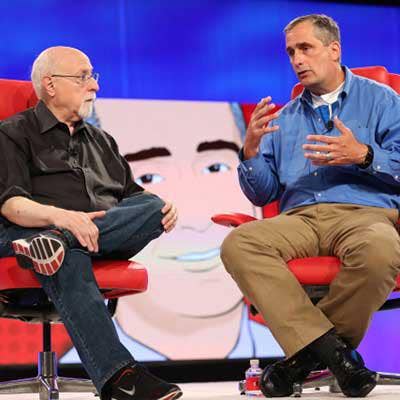
Intel's Game Plan
Intel CEO Brian Krzanich conceded "companies make mistakes" when his on-stage conversation with Recode.net's Walt Mossberg drifted to ARM processors and desktops.
"We moved it from mainframes to desktops to big, luggable desktops to laptops," he said. "Intel wanted to stop there but the market kept moving."
Krzanich said he's focused on pushing Intel products downward into wearables, such as a shirt he showed off onstage.
The company, at the same time, is not moving away from its core business, he said.
"PCs is a great business," Krzanich told the audience. "Many of you would love to have that business. It's a $30 billion business with good margins. And I don't think it's going to vanish. The PC's not dead. What we need to do is get into the new growing, emerging markets."
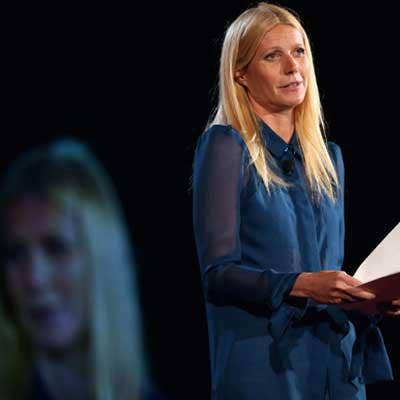
The Net For Empowerment?
Actress Gwyneth Paltrow was among the A-list celebrities on the conference roster.
Paltrow, who started lifestyle blog and e-tailer Goop.com in 2008, was drawing from personal experiences on what it's like to be the subject of other people's opinions when she talked about the impact of Facebook and the broader Internet during her presentation.
"The lack of empathy that is created when people can anonymously opine about the looks or actions of others has been very well-studied at this point," she said. "It's where we are in our culture."
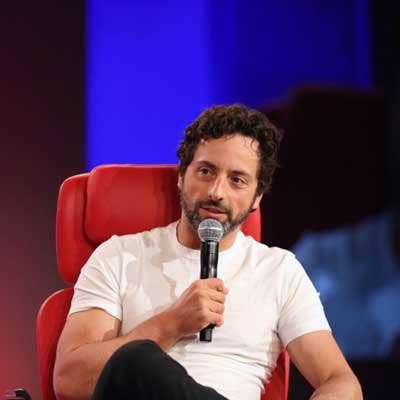
Is Google David or Goliath?
Google's two-seat driverless cars are cute, but how they'll impact the transportation industry remains to be seen.
Google Co-Founder Sergey Brin said that it's almost certain the company would partner with businesses such as Uber, but strategic details would be sorted out closer to an actual deployment.
Brin's talk covered security issues, Google Plus and more macro views, such as how Google has changed since its startup days.
"I'm sure the internal view is very different from the external view [of Google]," he said. "It's kind of David vs. Goliath only in the external view Google's the Goliath, and in the internal view we're David."
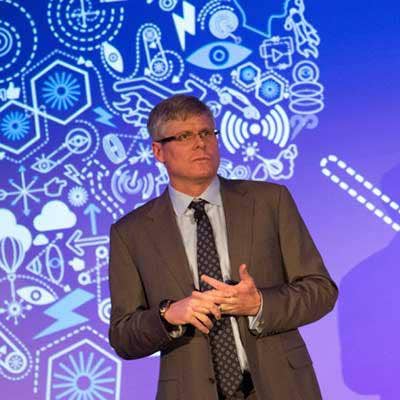
Qualcomm: Driverless Cars Need Chips
Steve Mollenkopf, CEO of Qualcomm, also talked cars and his new role as head of the company, during his time on stage. Mollenkopf is Qualcomm's former COO, succeeding Founder Paul Jacobs, who stepped down in March.
Mollenkopf said the company's chips could potentially be used for driverless cars.
"Everyone wants to emulate what you can see in your eye. The driverless car requires computer vision, and where that's being developed more than anywhere is on the phone," he said, according to a report on Recode.net.
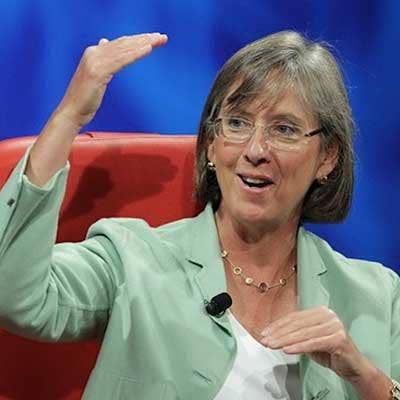
Market Trends
Concerns of another tech bubble are largely exaggerated. That's the word from Kleiner, Perkins, Caufield and Byers Partner Mary Meeker, who delivered her annual Internet trends report.
Tech IPOs last year were off about 73 percent compared to 1999. Meantime, venture capital financing in the tech market in 2013 was down about 77 percent from 2000's peak.
Growth of Internet users was 9 percent last year, slowing from an 11 percent growth rate in the previous year. The rate of smartphone growth is also moderating, Meeker said.